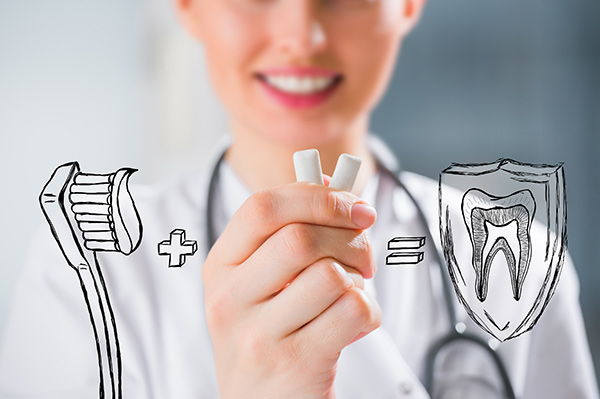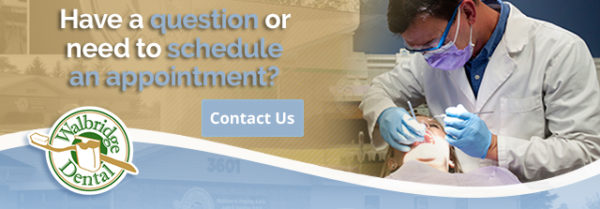
We often hear news about a new way to improve our health that seems to disappear from the headlines as quickly as it arrived. But one major discovery has been sticking in the dental health headlines for a while now: xylitol and its oral health benefits. But how is xylitol good for teeth?
Read on to learn more about xylitol, how it works and how it can play a role in your dental health.
What Is Xylitol?
Xylitol is one of several alternatives to sugar – known as artificial sweeteners – which can be used to add sweetness to foods or drinks with fewer calories than natural sugar. Xylitol itself is a sugar alcohol, which means it’s a chemical combination of molecules associated with sugar and alcohol. This combination allows it to trigger the same response in your taste receptors as natural sugar.
Xylitol is a natural substance. Unless other artificial sweeteners, xylitol can be found in fruits and vegetables and can be extracted from birch wood. It’s often used in sugar-free gum, diet pop and even candy.
Why Is Xylitol Considered Good for Your Teeth?
While it’s commonly understood that artificial sweeteners are considered in many ways better than sugar, you may still be wondering why Xylitol is good for your teeth. The answer involves two major factors:
Reduced Sugar Intake
One of the biggest benefits of xylitol is a reduction in sugar consumption. If you choose a xylitol-sweetened snack or drink over the sugar version, you’ve lowered your sugar intake. For those with a serious sweet tooth, this can make a big change in their daily diet.
The importance of a reduction in sugar consumption is how sugar plays into the microbiome of your mouth. Sugars are a favorite source of energy for the bacteria that live on your teeth and gums. When you eat or drink something sugary, sugar molecules are captured and eaten by these bacteria. Over time, these colonies of bacteria will grow, leaving acidic waste behind to chew through your enamel and the surfaces of your teeth.
In addition to the acidic attacks, thriving bacteria will harden into plaque, which can make them even more difficult to remove while they continue to assault the health of your mouth. If on the gums, bacteria or plaque can trigger inflammation and cause gum disease leading into more serious periodontal disease.
Xylitol Starves Bacteria
When you reduce your sugar intake, you decrease the number of growing bacteria in your mouth. But that doesn’t mean your mouth is clear of bacteria. Even persistent brushing and flossing don’t clear your mouth of all the bacteria living there.
Researchers looking into the question “is xylitol good for teeth” discovered that xylitol has a unique effect on plaque and bacteria. It actively kills or weakens bacteria in your mouth.
Essentially, the bacterium will attempt to feed off xylitol like natural sugar. However, xylitol provides little to no actual sustenance, which will prevent the bacterium from growing or producing acidic waste. As they weaken, they lose their efficacy for attaching to your teeth or gums – making them less harmful to your mouth.
The combined benefits of reducing overall sugar intake with the ability of xylitol to actively harm bacteria make it great alternative to sugar for sweetening your favorite types of food or drinks.
Are Other Artificial Sweeteners Good for Your Teeth?
In a way, yes. While xylitol is unique in how it attacks bacteria, all commonly used alternatives to sugar can help reduce your sugar intake. The abundance of sugar in modern foods – especially ones you may not expect them in – overload our mouths with a high amount of sustenance for the bacteria dwelling within.
Reduce your sugar intake in any way you can. Artificial sweeteners are one good option, but keep in mind they don’t do anything to undermine your sugar cravings. Artificial sweeteners are great for temporarily quieting a sweet tooth, but if you continue to eat sugar alternatives, your body’s general desire for sugar and sweet foods will remain. The best solution is to cut back on sugar as much as possible.
Sugar Isn’t the Only Cause of Cavities
Another important thing to remember is that sugar isn’t the only reason you develop cavities. Even in the realm of foods using xylitol or other sweeteners, you may still be increasing your chances of dental cavities.
While sugar feeds bacteria, acidic waste is what causes the real damage. If you drink pop sweetened with xylitol, carbonic acids will still weaken your enamel. Many other foods, from citrus fruits to sparkling water can offset the pH balance in your mouth and leave you vulnerable to cavities!
Do You Have Dental Health Questions? Schedule an Appointment!
We can help make sure you and your family are brushing correctly. If you’re concerned or just looking for information, the professionals at Walbridge Dental provide complete family dental care to families in the Millbury community. Contact us online to set up an appointment now or call us at 419-836-1033.
Connect on Social Media!

